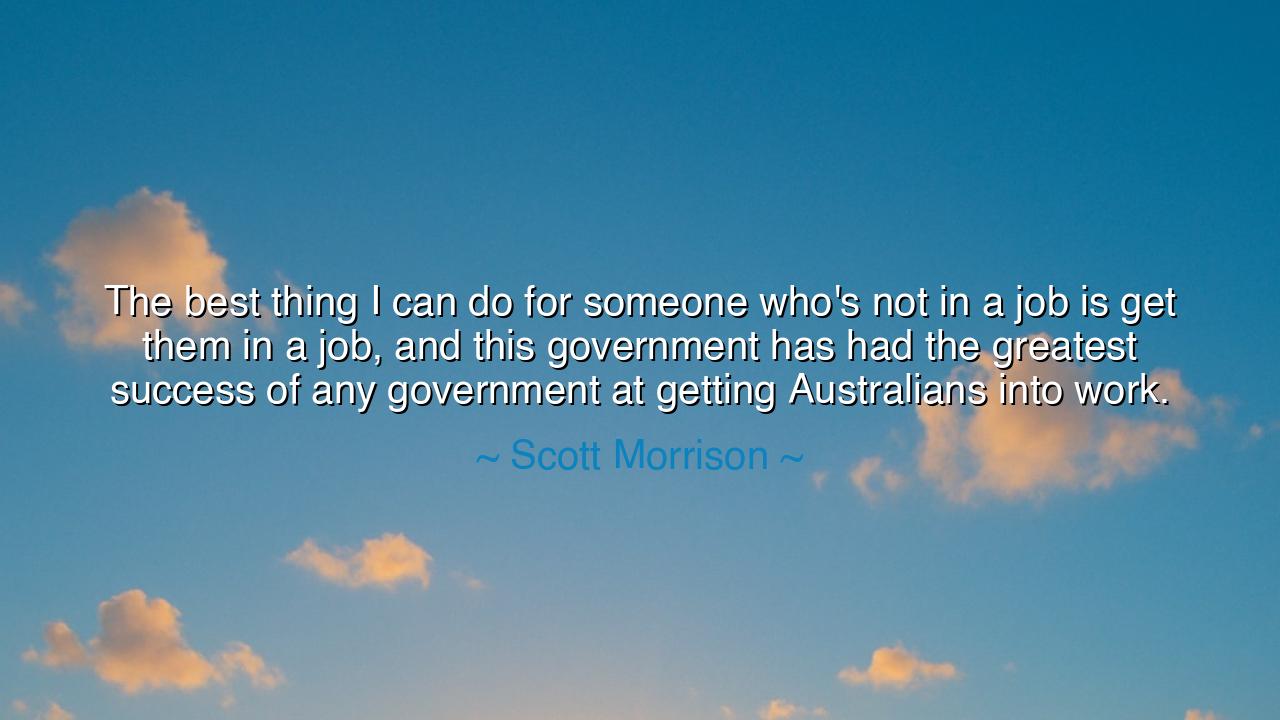
The best thing I can do for someone who's not in a job is get
The best thing I can do for someone who's not in a job is get them in a job, and this government has had the greatest success of any government at getting Australians into work.






Hear, children of labor and promise, and attend to the words of Scott Morrison, who once declared: “The best thing I can do for someone who's not in a job is get them in a job, and this government has had the greatest success of any government at getting Australians into work.” These are not words of vanity, but of conviction—a reflection upon the eternal dignity of work, the sacred bond between effort and purpose. Morrison speaks as one who believes that the measure of governance is not in gold or rhetoric, but in the empowerment of the people to labor, to build, and to sustain themselves with pride.
To understand these words, we must look beyond the politics of their age and see the timeless truth they hold. In every civilization, the promise of work has been a pillar of stability and hope. Employment is more than livelihood—it is participation in the life of the nation. The one who labors becomes part of a greater harmony, a builder of homes, bridges, and dreams. When Morrison declared that the best thing he could do for the jobless was to “get them in a job,” he echoed an ancient wisdom: that charity relieves, but opportunity transforms; that compassion must not stop at giving bread, but must extend to restoring dignity.
This belief has its roots in the history of nations reborn through work. Consider the story of Franklin D. Roosevelt during the Great Depression. America was broken by despair, its people wandering through unemployment and hunger. Roosevelt, through the New Deal, sought not merely to feed the hungry but to put them to work—building roads, dams, schools, and cities that still stand as monuments to labor’s redemptive power. He understood, as Morrison does, that to employ a person is to restore their sense of purpose, to make them co-creators in the destiny of their homeland.
Morrison’s statement also reflects a broader principle of governance: that the duty of a just government is to create the conditions where individuals may thrive through their own effort. In this, he draws upon a moral and economic truth—that human beings do not flourish in dependency, but in self-sufficiency. Work is not merely an exchange of time for wage; it is an expression of the human spirit. A job is freedom, a pathway to self-respect, and the means by which families and communities are strengthened.
Yet there is also humility in his words. When he speaks of “government success,” it is not to glorify authority, but to acknowledge that good policy serves the people best when it serves their ability to serve themselves. The greatness of any government is not measured by its size, but by its ability to uplift the will and potential of its citizens. When government acts wisely—removing obstacles, nurturing opportunity—it becomes a catalyst, not a master. Morrison’s tone is both proud and reverent, for he recognizes that to foster work is to touch the very foundation of social order.
History offers many lessons of what occurs when this truth is forgotten. When Rome grew decadent and its people ceased to labor, when they demanded bread without toil, its glory waned. Nations that neglect the dignity of work breed dependency and decay; those that cherish it thrive and endure. Thus, Morrison’s words are not simply about economics, but about moral civilization—the belief that every person, given the chance to work, becomes a contributor to the greater good, and that society must honor this sacred balance.
The lesson for all generations is clear: to uplift humanity, we must empower its labor. Each citizen should seek not only comfort but contribution; each government should strive not only to protect, but to enable. Help others find their purpose in work, for in doing so you kindle the light of self-worth. Build systems that value effort, reward initiative, and preserve the dignity of every worker, for such a foundation is stronger than any fortress.
Thus, Morrison’s words ring through time as both a promise and a principle: that the truest act of leadership is to awaken the strength of the people, to give them not dependency but destiny. And when a nation commits itself to that task—to the creation of meaningful work for all—then its prosperity is not merely material, but spiritual, rooted in the timeless truth that labor ennobles, and that through work, both the individual and the nation rise.






AAdministratorAdministrator
Welcome, honored guests. Please leave a comment, we will respond soon